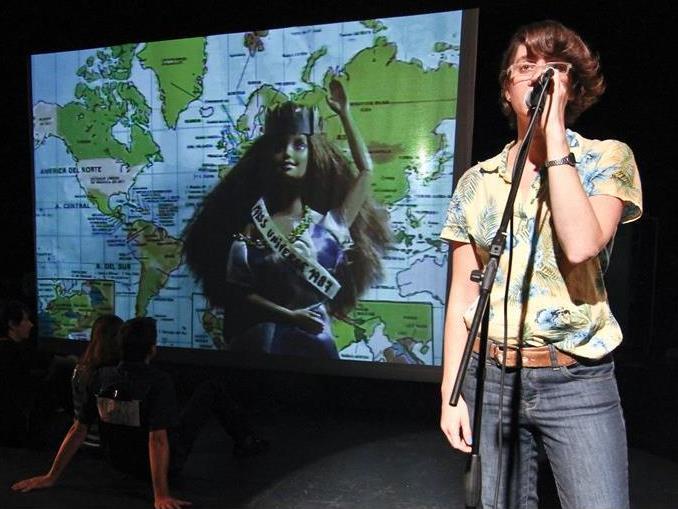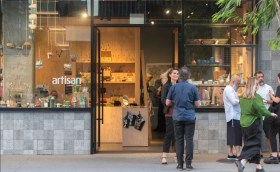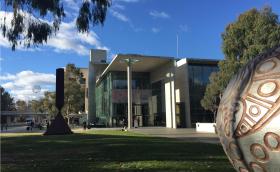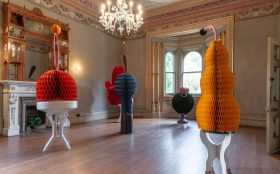Photo by David Alarc
Imagine being born under a brutal dictatorship responsible for the murder of over 3,000 of your fellow citizens and the arrest and torture of tens of thousands more. Now imagine that your mother was of those murdered – and then imagine yourself devising and performing in a theatre production alongside the sons and daughters of those who loyally served the regime for many years as members of the police and the military.
The Year I Was Born features performances by 10 Chileans born between 1973 and 1990 – the years when General Augusto Pinochet ruled Chile with an iron fist. Put in power by a violent coup d’état which overthrew the democratically elected socialist government of President Salvador Allende on 11 September 1973, and backed by the USA, Pinochet’s regime was responsible for murder, torture and exile on a shocking scale. It’s almost inconceivable that those whose parents were so badly abused by the forces of tyranny should agree to perform alongside their oppressors’ offspring decades later – yet that is precisely what occurs in this remarkable and moving piece of theatre created by Argentinean director Lola Arias.
Developed out of one of Arias’ earlier works, My Life After (which reconstructed the lives of its participants’ parents during the Argentine dictatorship of 1976 – 1983 through letters, photographs and other documents), The Year I Was Born welds documentary techniques, theatre games, frank confessions and painful memories to create a compelling theatrical mosaic; a composite picture of life under Pinochet – the good and the bad, and the almost unimaginable.
Featuring live music, and inventive camerawork projected on a screen which rises and falls as required – a sequence in which the camera slowly zooms into a tight close-up of a microphone stand held like a rifle, as one participant recalls his father’s memory of shooting a man, is particularly haunting – the production successfully balances moments of horror with moments of levity.
Cast members take turns to climb a ladder and shout the dictatorship’s proclamations from a megaphone as their fellow performers throw shoes at them. A woman describes in detail how her mother – a member of the left-wing resistance – was shot by police and her body posed for photographs published the following day on a newspaper’s front page; the only people who attended her funeral were the secret police. Participants bicker about whose parents were poorer, or whose were more right wing. A reporter’s child tells how police saved their father by sending him to an ordinary jail instead of to his execution. A radio broadcast from 11 September 1973 plays as toy tanks and toy soldiers are used to represent moments of horror and atrocity. A love letter, written on cigarette papers, describes intimacies and longing. A dead parent is described in simple but chilling terms: “Dad is a ghost.”
The Year I Was Born is not entirely successful; the structure and style of the production will be very recognisable to audiences familiar with devised work, which drains some of its potency and occasionally a sequence feels repetitive, though for the most part the work flows smoothly and without interruptions. Its tonal shifts are deftly balanced. Like any production dependent of surtitles to convey the finer details of its performances, it feels dense at first and somewhat baffling, but as The Year I Was Born unfolds its power builds, and the cumulative effect is considerable, even confronting.
We rarely see Latin American works in Australian arts festivals. Based on this compelling production, which has so much to say about our neighbours across the Pacific, I hope we see many more.
4 stars out of 5
The Year I Was Born
Written & directed by Lola Arias
A Fundación Teatro a Mil Production
Performers: Alexandra Benado, Leopoldo Courbis, Ítalo Gallardo, Soledad Gaspar, Alejandro Gómez Sepúlveda, Fernanda González, Viviana Hernández, Ana Laura Racz, Jorge Rivero and Nicole Senerman
Heath Ledger Theatre, State Theatre Centre of WA
15-18 February
Perth International Arts Festival
https://perthfestival.com.au/
10 February – 5 March 2017






